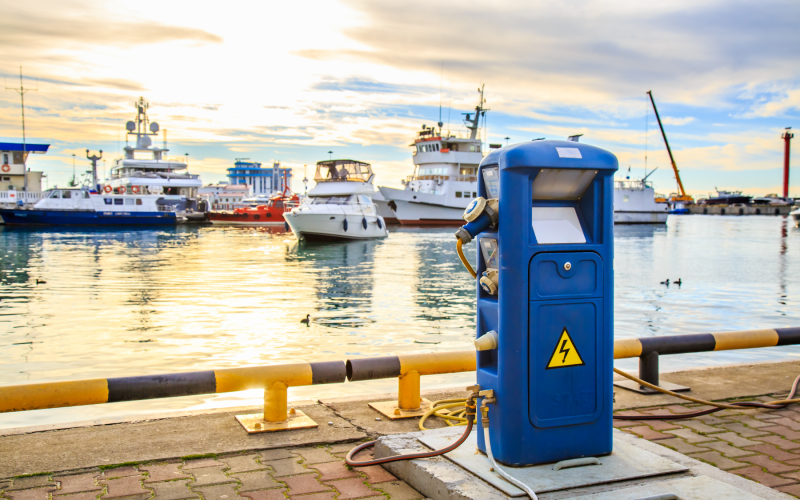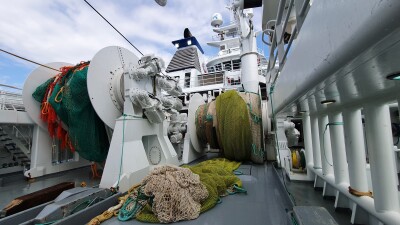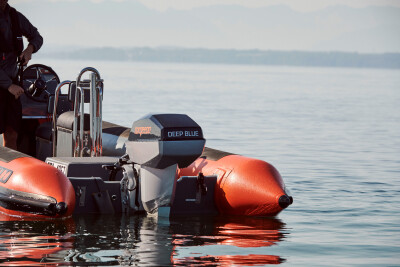While many of the sustainability initiatives for the commercial fishing industry are set to make a positive impact on the environment in the long run, going green is sometimes seen as just another cost by fishermen today. That’s why fishermen need to be at the helm, as their perspective is essential to consider when it comes to how safe, reliable, and affordable next-generation propulsion solutions will be developed. Especially considering the need to get ahead of requirements and mandates that could one day force some of these changes.
Those regulatory changes are something that Noah Oppenheim is especially focused on. The principal and founder of Homarus Strategies, his firm specializes in fisheries policy at all scales and levels of governance, ocean renewable energy issues, and navigating broad environmental regulatory frameworks.
Providing the financial and regulatory support for a smooth and cost-effective energy transition means approaching challenges with electrification and going green in terms of practicality, safety, and careful industry-led planning. A few organizations across the country that have been organizing efforts around fuel efficiency, emission reduction, and vessel electrification before it becomes a mandate for U.S. commercial fishing operations, from Alaska to Massachusetts to Maine.
“The fishing industry has a compelling story to tell, and vessels have primarily used diesel for generations,” Oppenheim said. “Though it is a very effective liquid fuel for reliable marine propulsion and companies will further investigate improving it, there is a need for this industry to get ahead of mandates. There are clear examples of when the fishing industry has had to or has been forced into requirements or to make changes that have not been safe, reliable, or cost effective and the results of this have weighed heavily.”
A wider effort to move away from diesel could demonstrate the fishing industry's leadership and commitment to sustainability and cleaner oceans. While the short-term costs of such efforts need to be considered, in the long term, they can also mean saving money and operating more efficiently in a way that positively impacts the bottom line. What does it mean to properly consider such things though? How can you best approach making your operation more sustainable? What does the technology look like, and how could you envision integrating it into your platform or business plan?
These are the sorts of questions that will be addressed during the Commercial Fishing Vessels Go Electric session at Pacific Marine Expo. The panel will investigate specifics like:
- Whether or not hybrid or fully electric vessels have a future in the U.S. fishing markets.
- How to find fuel-efficient solutions for your vessel now?
- What are the costs of going hybrid?
- Policy issues that must be addressed to enable cost-effective electrification.
The panelists will include Oppenheim as well as Linda Behnken, executive director of Alaska Longline Fishermen’s Association (ALFA), and Sarah Schumann, coordinator at Fishery Friendly Climate Action. These industry professionals from various areas of the commercial fishing community will outline how the effort to “go green” can result in operational efficiencies that ensure the long-term viability of individual businesses and the entire fishing industry.
Oppenheim looks forward to addressing the most daunting questions of the implementation of electricity in fishing operations, such as expenses and grant options for boat owners, shoreside infrastructure to support recharge stations for vessels and alternative liquid fuels, as well as the process of making this a safe and reliable option for the future of this industry. While they’re all details that the three specific programs focusing on introducing electrification efforts in the U.S. deal with, the program that Oppenheim is directly involved in is called Energy Efficient Fisheries based in Gloucester, MA.
This program is more of a planning effort right now, but all of this work and collaboration with Massachusetts industry leaders will put the fishing industry in a position to lead, helping to demonstrate new technologies in ways that makes sense for them today and for everyone tomorrow.
“We are doing an energy use assessment for a broad set of different fishing vessel types in Massachusetts, and then we plan on building out a process for shoreside and seafood industry electrification,” Oppenheim told National Fisherman. “We plan to use some of the funds in a few years to actually implement the buildouts to put new power trains on boats as proof of concept. There is room for more programs, and these conversations need to be had among the different fishing regions. I hope this session at PME leads to creative thinking among the audience about how fishermen can take advantage of these opportunities in specific regions.”
Generation after generation of fishermen have dealt with numerous different mandates that forces them into costly changes to their operations; however, the community has an opportunity to slowly implement technology that will not only help the industry become greener but save money in the long run by drastically cutting fuel costs.
Learn more about Commercial Fishing Vessels Go Electric session.
You can also discover all the sessions that define the 2023 PME Free Education Program.







